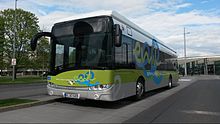
Back Batteriebus German 배터리식 전기버스 Korean Batteribuss NB Аккумуляторный электробус Russian Battery electric bus SIMPLE Batteribuss Swedish

A battery electric bus is an electric bus that is driven by an electric motor and obtains energy from on-board batteries. Many trolleybuses use batteries as an auxiliary or emergency power source.
Battery electric buses offer the potential for zero-emissions, in addition to much quieter operation and better acceleration compared to traditional buses. They also eliminate infrastructure needed for a constant grid connection and allow routes to be modified without infrastructure changes, in contrast with a trolleybus. They typically recover braking energy to increase efficiency by a regenerative brake. With energy consumption of about 1.2 kW⋅h/km (4.3 MJ/km; 1.9 kW⋅h/mi), the cost of ownership is lower than diesel buses.[1][2]
In 2018, the National Renewable Energy Laboratory (NREL) found that total operating costs per mile of an electric bus fleet in the United States in some cases may be less expensive than a diesel bus fleet.
- ^ Fraunhofer-Institut für Verkehrs- und Infrastruktursysteme Praxistest mit einem Fahrzeug zwischen 03.11.2014 bis zum 30.01.2015
- ^ BYD erhält Rekordbestellung über 2000 eBusse und 1000 Elektroautos Archived 2016-01-06 at the Wayback Machine V. 12. May 2014. Retrieved, 15 July 2015.